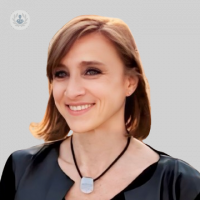Do people eventually recover from long COVID?
Written by:In this article below, long COVID is discussed at length and in expert detail by esteemed leading cardiologist, Dr Teresa Castiello. She reveals how common long COVID is, and tells us what cardiac symptoms people with long COVID typically suffer from.

How common is long COVID?
We talk about post-COVID syndrome or long COVID when one or more symptoms persist for three weeks or more after the initial COVID-19 infection. Sequelae from COVID-19 are unfortunately significantly more common than long-term symptoms after flu.
People with a minimum of two doses of the COVID-19 vaccination are reporting long COVID less frequently. However, long COVID remains very common, especially in women, obese people, in those with poor pre-COVID health, and also in patients who required hospitalisation prior to catching COVID-19.
On average, around six to 10 per cent of people who caught COVID-19 still experience chest pain or shortness of breath months after infection. Fatigue or brain fog sits at around five per cent, whilst it has been found that anxiety and depression is at roughly 15 per cent.
Additional symptoms such as adnominal disorders, headaches, or generalised pain have also been found to be present in up to eight to 10 per cent of patients. Tachycardia, including postural orthostatic tachycardia syndrome (POTS), is also frequently reported. Benign heart inflammation, renal damage, and diabetes have all also been found in patients suffering from long COVID symptoms.
What kind of cardiac symptoms are long COVID sufferers experiencing?
The main cardiac symptoms that derive from long COVID include chest pain, breathlessness, palpitations, fatigue, and alteration of both blood pressure and heart rate.
Are people suffering from long COVID still contagious?
Most commonly, the PCR test becomes negative after a few days, and as such, the patient is no longer contagious, despite still being symptomatic.
Do people eventually recover from long COVID?
As COVID-19 is a new virus, we do not have long-term data. Most of the long COVID cases tend to improve and then eventually recover, although this may take several months. Some damage remains irreversible, such as a large scar on the heart or on the lungs, and will require long-term follow-ups.
How are chest pain and palpitations from long COVID treated?
First of all, it is important to understand the reason behind these symptoms occurring as the mechanisms related to COVID-19 causing chest pain and/or palpitations are different. Symptoms may in fact be caused by myocardial inflammation, and so a cardiac-specific inflammatory therapy is indicated in this case.
If chest pain is instead caused by damage to the small vessels in the heart, medication such as beta-blockers, calcium-antagonist, or nitrate are indicated.
Are elderly people more susceptible to long COVID?
We noticed quite early that the elderly were more endangered by acute COVID-19. However, long COVID is not just affecting those with severe acute COVID presentations, but also those with or who have had a mild dose of COVID-19. UK data shows that the highest risk age group is between 45 and 69, while elderly people (>80 years old) have a similar risk factor when compared to those aged between 18 and 24 years of age.
In fact, women and younger individuals commonly experience long COVID. Having said that, elderly patients hospitalised are more likely to experience fatigue and cognitive issues, while shortness of breath and chest pain are observed more commonly in younger individuals.
Dr Teresa Castiello is an experienced cardiologist who specialises in chest pain and heart conditions. If you are noticing any long covid-related symptoms, be sure to book an appointment with her today via her Top Doctors profile.


